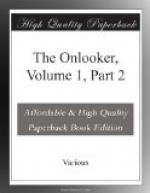No one has ever called me superstitious, and yet to begin my course-charting for a new career, I harked back to the old Astor House. It was there that brilliant thought of tobacco overtook me two years before. Perhaps an inspiration was to dwell in an environment. Again I registered, and finding it tenantless, took over again my old room.
Still I cannot say, and it is to that hostelry’s credit, that my domicile at the Astor aided me to my smuggling resolves. Those last had growth somewhat in this fashion: I had dawdled for two hours over coffee in the cafe—the room and the employment which had one-time brought me fortune—but was incapable of any thought of value. I could decide on nothing good. Indeed, I did naught save mentally curse those Washington revenue miscreants who, failing of blackmail, had destroyed me for revenge.
Whatever comfort may lurk in curses, at least they carry no money profit; so after a fruitless session over coffee and maledictions, I arose, and as a calmative, walked down Broadway. At Trinity churchyard, the gates being open, I turned in and began ramblingly to twine and twist among the graves. There I encountered a garrulous old man who, for his own pleasure, evidently, devoted himself to my information. He pointed out the grave of Fulton, he of the steamboats; then I was shown the tomb of that Lawrence who would “never give up the ship”; from there I was carried to the last low bed of the love-wrecked beautiful Charlotte Temple.
My eye at last, by the alluring voice and finger of the old guide, was drawn to a spot under the tower where sleeps the Lady Cornbury, dead now as I tell this, hardly two hundred years. Also I was told of that Lord Cornbury, her husband, once governor of the colony for his relative, Queen Anne; and how he became so much more efficient as a smuggler and a customs cheat, than ever he was as an executive, that he lost in 1708 his high employment.
Because I had nothing more worthy to occupy my leisure, I listened—somewhat listlessly, I promise you, for after all I was thinking of the future not the past, and considering of the living rather than those old dead folk, obscure, forgotten in their slim graves—I listened, I say, wordlessly to my gray historian; and somehow, after I was free of him, the one thing that remained alive in my memory was the smuggling story of our Viscount Cornbury.
Among those few acquaintances I had formed during my brief prosperity, was one with a gentleman named Harris, who had owned apartments under mine on Twenty-second Street. Harris was elegant, educated, traveled, and apparently well-to-do in riches. Busy with my own mounting fortunes, the questions of who Harris was? and what he did? and how he lived? never rapped at the door of my curiosity for reply. One night, however, as we sat over a late and by no means a first bottle of wine, Harris himself informed me that he was employed in smuggling; had a partner-accomplice




